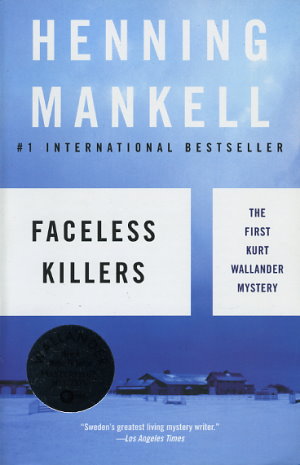
So ill-drawn are some of the characters that one wonders if a first person narrative may suit Mankell more, allowing Wallander the depth, and giving the excuse of Wallander's perception of others to justify their poorer treatment. The prosecutor (and putative lust interest) Ms Brolin is one character that seems particularly flat. Wallander's father - never satisfied, slightly ill-tempered, and suffering from a serious illness - has potential to be an interesting character, but seems instead to act as a checkbox to note Wallander's famly troubles. However, the depth given to Wallander means that supporting characters suffer. You may not like Wallander but so crafted is the character that his motivation is comprehensible. Wallander's flaws, his racism (his observations on asylum seekers, for example), and his misogyny, for example, create a rounded well-drawn character. He has a strained relationship with his father and daughter, has recently separated, and falls into a number of stereotypes as the "loner" cop. Wallander is not the most likeable of characters. Wallander is a fascinating character, and while the novel is third person narrative, so much is written from Wallander's perspective that the novel might as well be in the first person. The second half of the novel is more slackly paced, the denouement slightly disappointing. The tension is built up well in the first half of the novel, and the investigation of the murder, and the racial incidents, maintains high interest.
#FACELESS KILLERS A KURT WALLANDER MYSTERY SERIES#
When news of this leaks out Wallander is drawn into a series of racially motivated incidents, and investigations around camps holding asylum seekers. There are few clues, other than the last word of the second murder victim, "Foreigners". It begins with a vicious murder to which Wallander is called. The opening chapters of the novel are gripping. Set in rural Sweden it is a police procedural.

This is the first in Mankell's Inspector Wallander series. Henning Mankell was a new writer to me, but having seen comparisons of his genre fiction with that of Ian Rankin I tried this novel. Note: The book was made into a 3 1/2 hour mini-series for Swedish television in 1994 which is apparently unavailable in English. Still, the procedural aspect is very good and the overall atmosphere will be interesting to those who like crime novels from foreign climes.

Hopefully future installments will see a more well-rounded cast of supporting characters. This is a disappointment, for as sympathetic a character as Wallender is, he can't really carry the book on his own. One gets the sense that some, such as his father, daughter, and the new prosecutor will be developed in the future, but his colleagues all blend together in a faceless mass. Alas, other than Wallender, who himself is a borderline parody of a middle-aged alcoholic mess of a cop, the characters aren't developed very much. Wallender, probably like most of his countrymen, finds himself troubled by the situation and straddling the fence in many ways. The immigration issue is handled fairly well and raises difficult questions. The story is written in prose that can perhaps best be described as methodical, and when combined with the bleak weather, it ably captures the reserved nature of Scandinavia. The breakthrough that leads to the solution seems to come out of nowhere, but it works nonetheless. Despite the best efforts of Wallender's team, they just can't seem to get anywhere as the months drag on.


Soon a firebombing of a refugee camp increases the pressure for a quick solution, and then a Somali is shotgunned to death, making for even more problems. It doesn't help that Wallender eats junk food for meals and drinks himself to sleep. His wife has just left him, his teenage daughter is estranged from him, and his aging father gives new meaning to the word cantankerous. With the chief out of town, Wallender spearheads the investigation into the apparently motiveless crime, while at the same time struggling to cope with his disintegrating personal life. In this first book, an elderly couple in the southern coastal town of Ystad are brutally tortured and murdered, and the only clue is the word "foreigners." As there are a number of refugee camps in the nearby countryside, the issue of immigration and asylum becomes central to the story. Just as the Martin Beck series was a lens for the authors' liberal view of a changing Swedish society, Mankell uses the crime novel as a way of addressing the dilemmas of modern Sweden. Mankell picks up where they left off, introducing a new weary policeman with this first in the Kurt Wallender series, which was originally published in 1991. Maj Sjowall and Per Wahloo invented the modern Swedish police procedural with their ten-book Martin Beck series, which ended in the late 1970s.


 0 kommentar(er)
0 kommentar(er)
